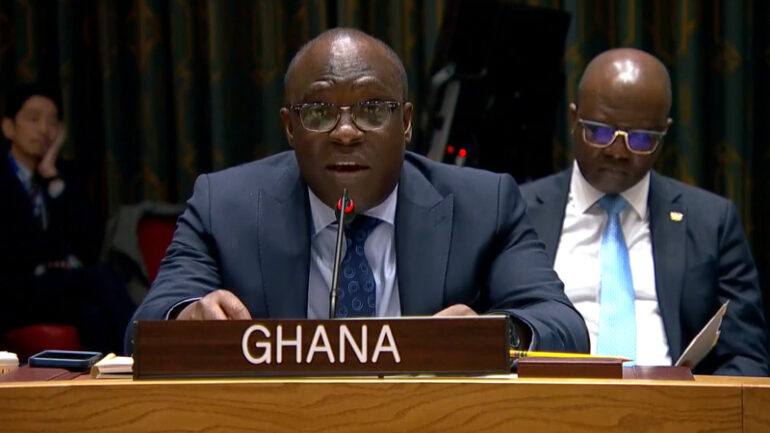UNSC Meeting on Threats to international peace and security (Sea-level rise)

STATEMENT AT THE OPEN DEBATE ON SEA LEVEL RISE AND ITS IMPLICATIONS FOR INTERNATIONAL PEACE AND SECURITY
Mr. President,
Let me thank Malta for its leadership on the issue of sea level rise and its implications for international peace and security. I also thank the briefers for their insightful presentation. The existential risks to humanity, posed by rising, and increasingly extreme, sea levels is evident. The IPCC’s special report on the Ocean and Cryosphere has already sounded the alarm – sea level rise is both a present and future danger. Sea level rise poses a clear risk to livelihoods as well as to the security and wellbeing of millions who live in low-lying coastal areas, particularly Small Island Developing States.
The homes, culture and identity of millions are being destroyed or lost. Water sources for millions are being salinized. Food systems for millions are being wiped away. The long-term sea-level rise implications for the integrity of maritime boundaries, ownership of marine resources, and the statehood of affected countries call for urgent action. Delaying action means being too late to make the needed difference. While some may argue that we are, in this context, not threatened by the force of arms, the existential risks posed by sea level rise show that the consequences of the forces of nature could be similar if not worse. Combined with the complex, multifaceted and simultaneous impact of other crises, the implications of sea level rise for international peace and security
are unimaginable.
In several parts of Africa, for instance, we are beginning to witness increasing incidents of coastal erosion, coastal flooding, and powerful storm surges, including in West Africa, where coastal communities account for a third of the population and generate more than half of the region’s GDP. As estimated by the World Bank, erosion, flooding, and pollution cause US$3.8 billion in damages annually in Benin, Cote d’Ivoire, Senegal, and Togo alone.
In Ghana, my own country, rising sea levels on our 580km coastal stretch has threatened historic towns like Keta, Ada, and Shama. Rising temperatures have triggered the migration of fish stocks, while salinisation has contaminated farmlands and freshwater reserves affecting the livelihoods of fisherfolk and farmers. Frequent inundation has led to forced migration, displacement, the destruction of property, and even human lives. Rising sea levels are therefore impacting lives and livelihoods negatively.
Colleagues,
While discussions on climate change-related subjects in the Council have not always been consensual, it is important that we act collectively in anticipating threats to international peace and security, no matter the definition of the risk, and mobilize international commitment and solidarity for addressing those threats, including through the relevant bodies. That said, we would want to share four priority areas of global action.
First, we believe that in the light of the long-term trajectory for sea level rise, as confirmed by several scientific modelling, adaptation efforts of protection, reclamation and accommodation to reduce coastal risks should be supported on an urgent basis, especially for SIDS. Such adaptation efforts, to develop resilience, would require strengthened international partnerships and adequate funding. We also urge respect for community-based resource
management practices and nature-based solutions for sustainable outcomes.
Second, mindful of the non-climatic drivers for the incidents of sea-level rise, we emphasise the need for the faithful implementation of the commitments for climate action to urgently reduce greenhouse emissions. We therefore call for the redoubling of efforts by major emitting countries to align their 2030 Paris Agreement emission targets with the 1.5 degrees Celsius goal, which is a survival limit for the most vulnerable. Indeed, 2 degrees Celsius is a death sentence for small Island developing countries in the Pacific, Asia, and Africa.
Third, climate action is impossible without adequate finance. Adequate climate finance is equally impossible if developed nations continue to renege on their commitments and obligations. As the Secretary-General indicated
last week, developed countries know what they must do. We join the SG in calling on developed countries to do what they know they must do urgently. They must, at a minimum, begin with delivering on the commitments made at the most recent COP, including:
• the long-delayed delivery of the 100 billion US dollars promise to developing countries;
• Operationalising the loss and damage fund agreed in Sharm El-Sheikh.
• Doubling adaptation funding including a Standalone “Implementation Plan”
• Replenishing the Green Climate Fund by COP28.
• Advancing plans for early warning systems to protect every person on earth
within five years.
Fourth, we must strengthen existing mechanisms to peacefully prevent and resolve conflicts in this era of climate change. This includes land-based conflicts over diminishing resources as well as tensions relating to ocean governance. We are pleased to note that these dimensions of the problem as well as the broader implications for the protection of vulnerable persons and those relating to the potential loss of sovereignty are already under
consideration by the International Law Commission. We commend the work of the Commission and the Study Group and call for cooperation and support in their efforts to develop and provide the legal framework to address the impacts of sea level rise and for the maintenance of international peace and security in the oceans and seas.
Mr. President,
In conclusion, let me state that the time when the risks to international peace and security could be put in neat, simple categories for action are fading. With the adverse effects of climate change and sea level rise, and the looming threat of a climate catastrophe, we face a present and loomimg danger, never imagined in modern times. We must mobilise our collective capacity as never before to head off this threat to our existence.
I thank you.
